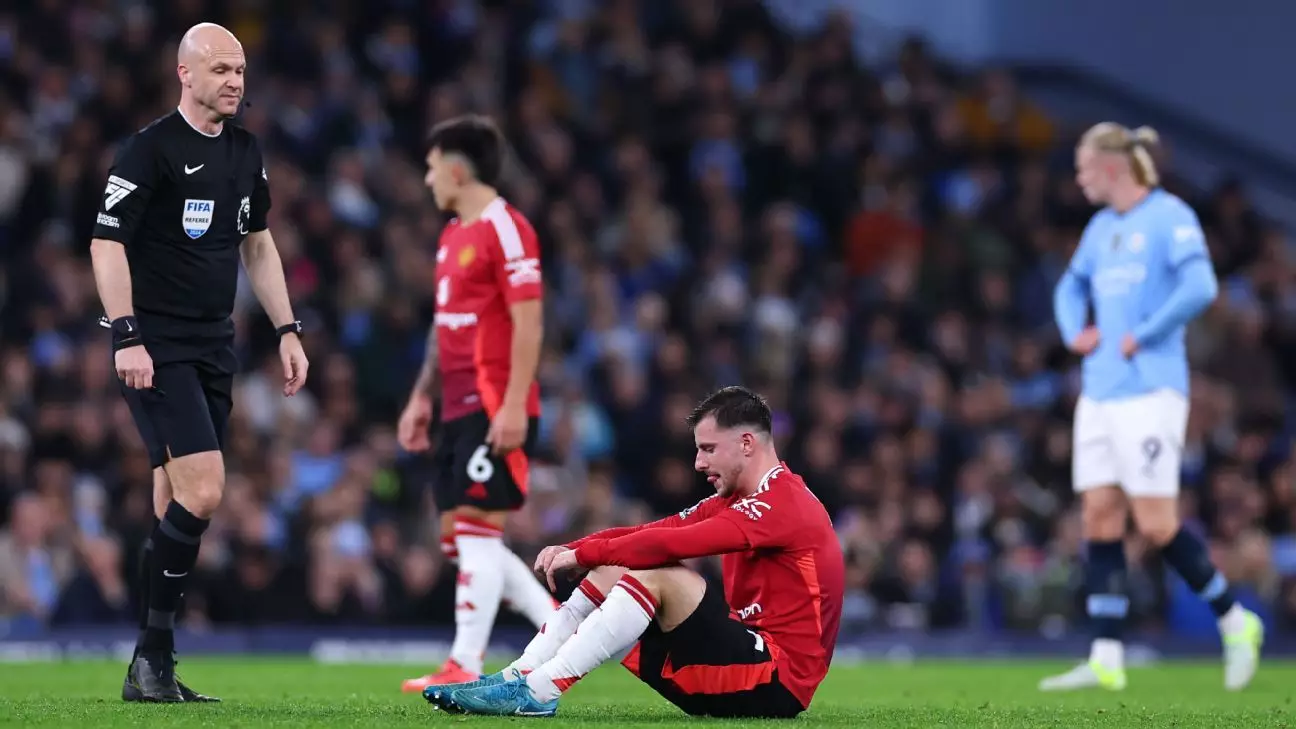The realm of professional football is ever-demanding, with coaching staff and players alike feeling the weight of high expectations and rigorous schedules. The recent developments surrounding Manchester United’s head coach Ruben Amorim and star midfielder Mason Mount exemplify the challenges faced in maintaining squad fitness and morale. Mount, a player whose potential has been clouded by injury, finds himself once again sidelined, bringing to light the broader implications for the team.
Mason Mount’s recent muscle injury, occurring just 14 minutes into the Manchester derby, has thrust the midfielder back into the spotlight for all the wrong reasons. Emerging from a spell of injuries that have marred his tenure at Manchester United, Mount’s situation raises significant concern. Having completed a full 90 minutes only once in the past 18 months, his repeated setbacks have been disheartening not only for him but also for supporters and the coaching staff.
Amorim’s statement that Mount is currently seeing a specialist highlights the uncertainty surrounding the severity of his condition. The head coach’s careful phrasing hints at a touch-and-go situation that could either lead to a swift recovery or an extended period on the sidelines. When a key player’s availability hangs in the balance, it can disrupt team cohesion and game strategies, ultimately affecting match outcomes.
In conversations following Mount’s substitution during the derby, Amorim noted the midfielder’s visible distress. The emotional burden that injuries impose on athletes cannot be overlooked. For a player like Mount, who is eager to prove his worth at a club with significant aspirations, being sidelined is not just a physical setback but a psychological one as well. Amorim’s empathetic approach in addressing Mount’s emotional state underscores the human aspect of coaching, wherein players are viewed not just as athletes, but as individuals facing personal battles.
The challenge lies in balancing player fitness with the demands of a packed schedule. With travel hindering training opportunities, finding ways to keep injured players engaged and mentally ready becomes critical. The coach’s acknowledgment of the strain this puts on players like Mount and Luke Shaw suggests a need for a more tailored recovery approach, one that considers both physical rehabilitation and mental wellness.
As the squad faces the upcoming Carabao Cup quarterfinal against Tottenham Hotspur, the absence of crucial players like Mount and likely Marcus Rashford complicates preparations. Rashford’s own situation, marked by illness and speculations about his future, adds another layer of uncertainty. The fact that he was omitted from the trip to London raises questions about his current standing within the team and his engagement with the club’s direction.
Amorim’s comments regarding Rashford’s public expression of his desire to leave reflect a nuanced understanding of player management. While open communication between players and coaches is vital, public declarations can disrupt team morale and focus. Amorim’s call for unity and concentration on the Spurs match signals a crucial juncture for the team, one where maintaining a cohesive front is essential amid external distractions.
In navigating these tumultuous waters, Manchester United must not only address the individual concerns of its players but also foster a team ethos that can withstand the pressures of modern football. Developing a robust support system for injured players, ensuring clear lines of communication, and building resilience within the squad will be crucial in overcoming these challenges.
Mount’s journey back to fitness will require patience, careful monitoring, and perhaps a shift in how the coaching staff approaches rehabilitation. Meanwhile, the remaining squad members must rally, fortifying their resolve as they face a key match against one of their rivals.
Manchester United is at a critical point, where the management of injuries and the interpersonal dynamics within the team will play pivotal roles in shaping their season. With thoughtful strategies and community-oriented approaches, the club can hope to navigate this difficult period and emerge stronger.

